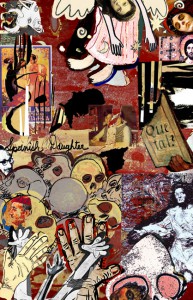 American in Translation: A Novel in Three Novellas is Concha Alborg’s first novel written in English. In preparation for this book, the author taped conversations with her father, who fought on the liberal side during the Spanish Civil War; collected magazine and newspaper articles from the Vietnam era; and gathered many personal letters, journals and travel notes of the thirteen months when her own husband, a Marine Corps captain, was in Vietnam. American in Translation is written with the author’s characteristic irony and self-deprecating humor that contrast with the seriousness of its themes.
American in Translation: A Novel in Three Novellas is Concha Alborg’s first novel written in English. In preparation for this book, the author taped conversations with her father, who fought on the liberal side during the Spanish Civil War; collected magazine and newspaper articles from the Vietnam era; and gathered many personal letters, journals and travel notes of the thirteen months when her own husband, a Marine Corps captain, was in Vietnam. American in Translation is written with the author’s characteristic irony and self-deprecating humor that contrast with the seriousness of its themes.
American in Translation is a woman’s journey from the Vietnam era to the present. Each novella represents a pivotal time in the life of Inmaculada, a young Spanish woman who has recently emigrated to the United States. Thus, it is an immigrant story and a coming of age narrative at the same time. A coming of age story of sorts, that is, because the protagonist is already a young woman. Her initiation is to the American way of life. See more about this book under “Reviews.”
“Marine Corps Wife” is told from Inma’s point of view during the year when her husband is fighting in Vietnam, while she is in a small Midwestern college town with their new-born daughter. The tension between Inma’s own pacifism, the ensuing war protests at home, and her family responsibilities, become a balancing act for the young wife. Much has been written about the Vietnam conflict from the point of view of the soldiers, but little from the female perspective of the wife who, like Inma, is left behind, trying to keep her family together. War figures as a motif in this novella because the grandfathers also fought in WWII and the Spanish Civil War respectively.
“Spanish Daughter,” told in a different voice, begins with the death of Inma’s mother, which reveals tensions and betrayals within her own family. Inma’s inner struggle is accentuated when she discovers her father’s affair with a favorite aunt, and she reads his letters, included in this novella. In contrast with the more liberated 1970’s of American culture, Spain was suffering from growing pains after decades of a repressive government. Ironically, the personal and the political become one, since Franco is dying at the same time, and in the same hospital, as Inma’s mother.
Inma’s true liberation comes in the third novella, “American Woman,” told through her journals while traveling in Europe and the States, and in direct conversations with her therapist, who is helping Inma find the strength to divorce her husband. Finally, Inma emerges as a fully realized woman: at the personal level through a sexual and emotional awakening, and at the professional level through her work and her writing. The “Translation” of the title becomes emblematic of her transformation and the complexities of American life.
Cover and novellas’ illustrations by Dwayne Booth, Mr Fish: www.clowncrack.com

![MarineCorpWife[1]](http://0366621.netsolhost.com/wordpress/wp-content/uploads/2012/10/MarineCorpWife11-193x300.jpg)

